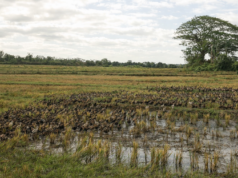MALOLOS CITY—The National Union of Journalists of the Philippines (NUJP) announced the creation of the Justice Fund on Friday (Jan. 1), the 40th day of the Maguindanao Massacre that claimed the lives of persons, including 31 journalists.
This came as Bob Dietz, Asia coordinator of the Committee to Protect Journalists (CPJ), quoted Sheila Coronel’s memo in his blog entitled “Maguindanao mourning period ends, and long road begins” posted on the CPJ website on the same day.
A member of the CPJ Board, Coronel is director of the Stabile Center for Investigative Journalism at the Columbia University Graduate School of Journalism. She was one of the foremost investigative reporters in the country.
In a press statement issued on the night of Jan. 1, NUJP national chair Nestor Burgos said that the Justice Fund “seeks to raise the necessary finances that will help address the needs of the families of the victims of the massacre including a trauma counseling program, the implementation of a training program for the local media and supporting the legal and advocacy efforts to seek justice for the victims.”
He said NUJP identified five target areas for the Justice Fund that include: a trauma counseling program for the families and members of local media; enhancement of the capabilities of media practitioners in Mindanao through a series of training on risk awareness and safety; election reporting and reporting on culturally and politically sensitive places such as Mindanao; litigation support; public awareness campaigns; and the documentation of other incidents of harassment and attacks on the press in Mindanao.
The Justice Fund also aims to build solidarity between media and the public, and to deepen public understanding of factors that led to the massacre.
“The Justice Fund seeks to build awareness not just on what happened in Ampatuan, Maguindanao on November 23, 2009 but on the system that breeds corruption, warlordism and political patronage which paved the way to the carnage,” Burgos said.
As this developed, Dietz wrote on his blog parts of the memo that Coronel sent to other members of the Board of the CPJ after her visit in Manila.
Quoting Coronel, Dietz wrote, “effort will require an unprecedented level of resources, commitment, and collaboration” referring to challenges that lay ahead in seeking justice for the victims of November 23 Maguindanao Massacre.
He said that Coronel told the CPJ saying, “journalist and lawyer groups in the Philippines have not dealt with something on this scale before: 57 victims, several sets of lawsuits involving potentially scores of litigants, and accused murderers who are not only powerful, wealthy and well-armed but also have a well-funded and sophisticated defense team.”
Dietz further wrote, “No single entity—probably not even the Philippine Department of Justice—has the resources and the capacity to adequately prosecute the Maguindanao cases on its own.”
He also cited several concerns involving funding and resources including costs of litigation, support for victim families, support for witness protection program, support for advocacy and documentation, international support, and forensic expertise.
This came as Bob Dietz, Asia coordinator of the Committee to Protect Journalists (CPJ), quoted Sheila Coronel’s memo in his blog entitled “Maguindanao mourning period ends, and long road begins” posted on the CPJ website on the same day.
A member of the CPJ Board, Coronel is director of the Stabile Center for Investigative Journalism at the Columbia University Graduate School of Journalism. She was one of the foremost investigative reporters in the country.
In a press statement issued on the night of Jan. 1, NUJP national chair Nestor Burgos said that the Justice Fund “seeks to raise the necessary finances that will help address the needs of the families of the victims of the massacre including a trauma counseling program, the implementation of a training program for the local media and supporting the legal and advocacy efforts to seek justice for the victims.”
He said NUJP identified five target areas for the Justice Fund that include: a trauma counseling program for the families and members of local media; enhancement of the capabilities of media practitioners in Mindanao through a series of training on risk awareness and safety; election reporting and reporting on culturally and politically sensitive places such as Mindanao; litigation support; public awareness campaigns; and the documentation of other incidents of harassment and attacks on the press in Mindanao.
The Justice Fund also aims to build solidarity between media and the public, and to deepen public understanding of factors that led to the massacre.
“The Justice Fund seeks to build awareness not just on what happened in Ampatuan, Maguindanao on November 23, 2009 but on the system that breeds corruption, warlordism and political patronage which paved the way to the carnage,” Burgos said.
As this developed, Dietz wrote on his blog parts of the memo that Coronel sent to other members of the Board of the CPJ after her visit in Manila.
Quoting Coronel, Dietz wrote, “effort will require an unprecedented level of resources, commitment, and collaboration” referring to challenges that lay ahead in seeking justice for the victims of November 23 Maguindanao Massacre.
He said that Coronel told the CPJ saying, “journalist and lawyer groups in the Philippines have not dealt with something on this scale before: 57 victims, several sets of lawsuits involving potentially scores of litigants, and accused murderers who are not only powerful, wealthy and well-armed but also have a well-funded and sophisticated defense team.”
Dietz further wrote, “No single entity—probably not even the Philippine Department of Justice—has the resources and the capacity to adequately prosecute the Maguindanao cases on its own.”
He also cited several concerns involving funding and resources including costs of litigation, support for victim families, support for witness protection program, support for advocacy and documentation, international support, and forensic expertise.




